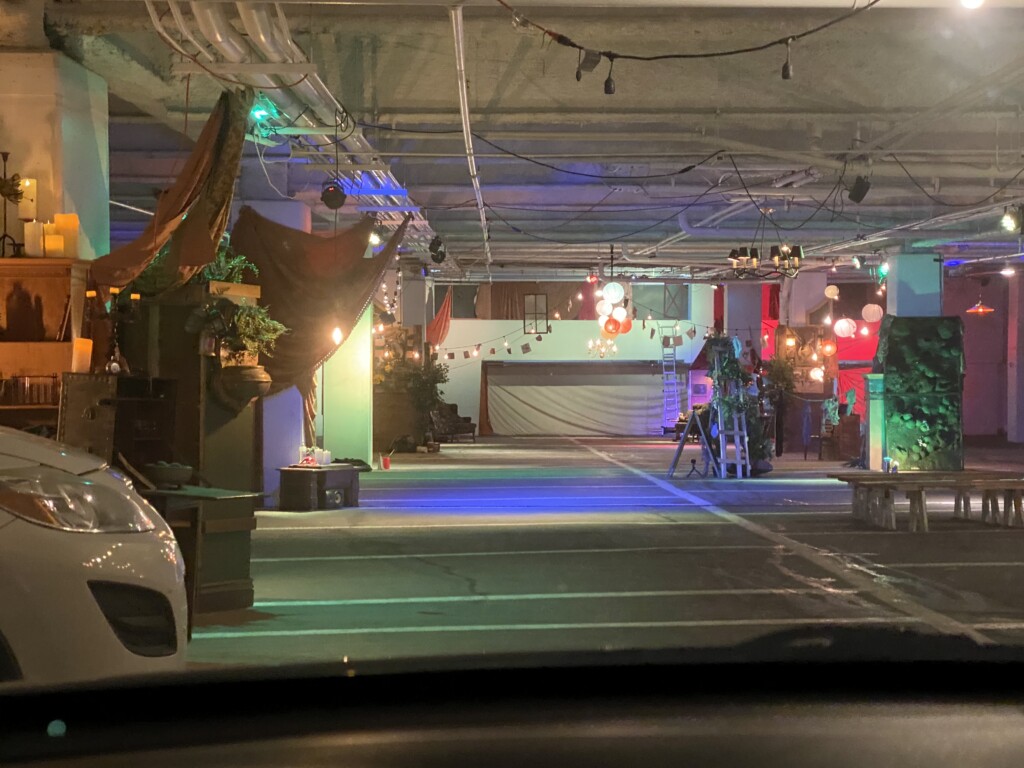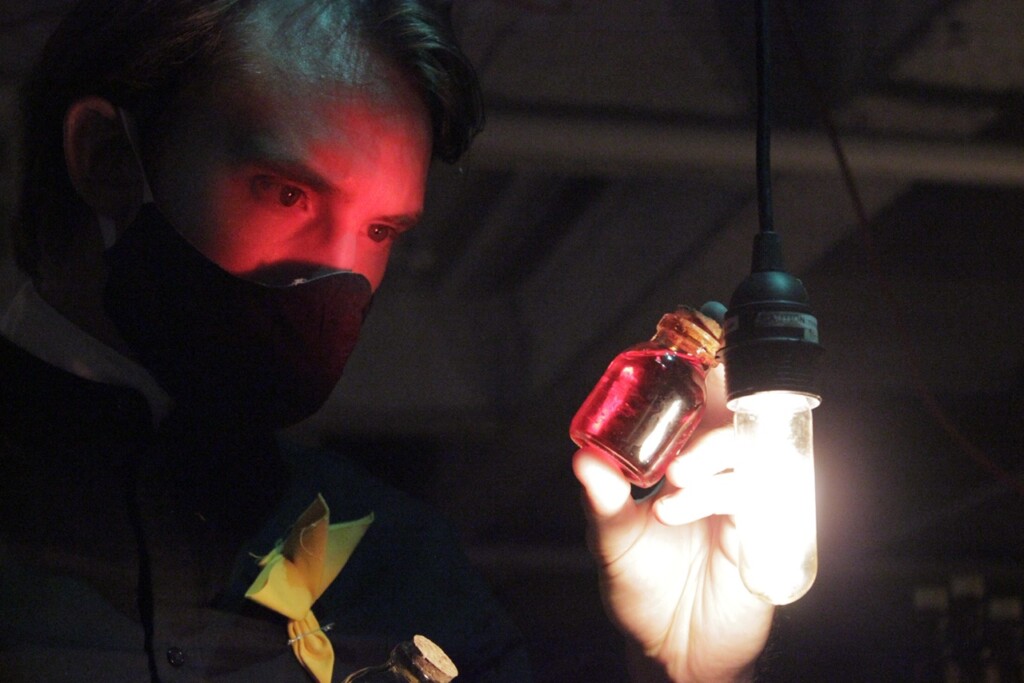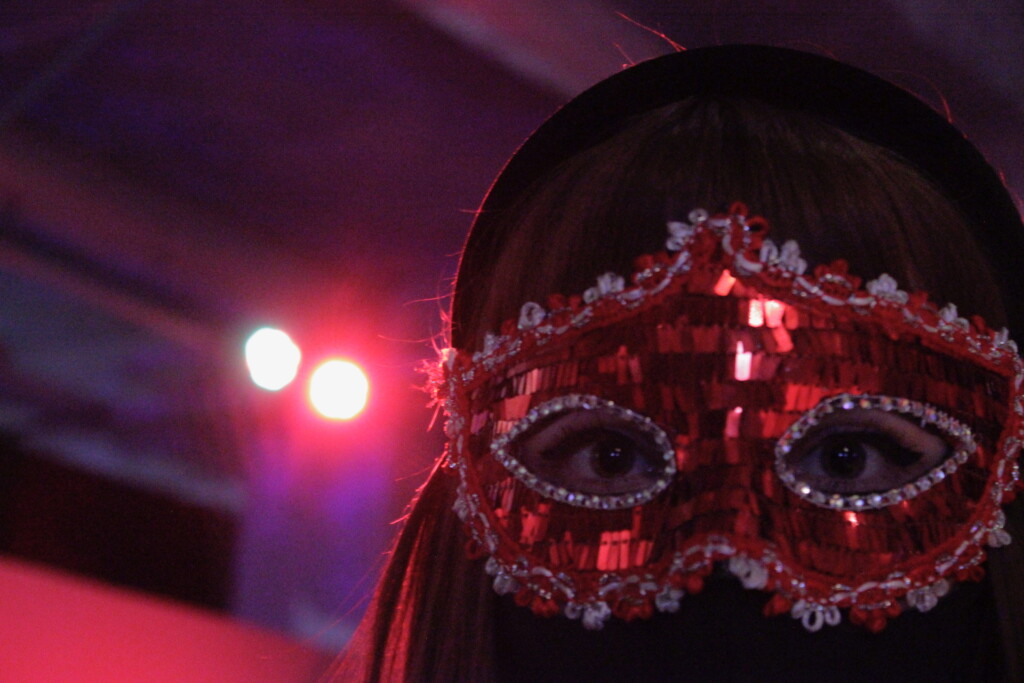From teachers to stage producers and to filmmakers and artists, Shakespeare’s Romeo and Juliet has been taken up as a fervent challenge to make one of the western canon’s most familiar stories relevant, meaningful and fresh to contemporary audiences. In SONDERimmersive’s new Through Yonder Window production, staged in a row on the upper deck of the northside parking garage at The Gateway complex in downtown Salt Lake City, the town of Fair Verona becomes the site of tensions between those either trying to preserve or usurp the bourgeois normalcy in the face of passion and tragedy.
The smart hour-long production, created by Graham Brown and Rick Curtiss, plays up the urgently relative tropes of isolation, unrest, impatience, alienation, loneliness, mutual love and unrequited passion not just in the original’s main characters but, more importantly, also in the minds and hearts of Verona’s townspeople who have various ties to the Montagues and the Capulets. There is a blend of the original Shakespearean language with an accessible contemporary vernacular, in Curtiss’ script. However, any preponderance of literalism also is subsumed significantly to the abstractions propelled by the choreographed movement by Brown and original music, composed by Wachira Waigwa-Stone. The music, a nice compendium of jazz, electronica, percussion and pop elements, matches up nicely with the wavelength of each character’s mood and dramatic moment.

Just as important is the production’s total adherence to COVID-19 pandemic restrictions and cautions, making the parking garage setting the most feasible and logistical choice for the production. Upon arriving at the parking garage entrance, drivers and their passengers are directed to the location, where they are guided into a precisely angled spot by the show’s staff. Car engines are turned off and the audience is instructed to remain in their vehicles and then turn their FM radio dial to a specific call number spot, where the soundtrack of the show is transmitted. After the show, cast members quickly sanitize any windows and surfaces on the vehicles with which they may have come in contact with during the performance.
The cast of eight characters is masked throughout the show and the dance movement is choreographed so that the performers never come closer than six feet within each other, a requirement that would be near impossible on many indoor stages with or without a proscenium. Here, the social distancing is not a creative limitation. Graham’s choreography brings home the full emotional and mood impact of negative space in dance movement. And, it gives the audience, which is watching the action unfold in Fair Verona from inside their vehicles, the liberty of deciding how they should focus on the characters and their stories. The six characters besides the star-crossed lovers are just as paramount in this production. The quest for love is ubiquitous.

Watching from the vantage of the entire longitudinal view of the town set, one experiences the range of contrasts between and among characters, as represented in their movement accompanied by the radio soundtrack. There is a marvelous bit of the sacred and profane, watching an unsanctioned Carnaval-like masquerade party occurring further back while the friar (Tyler Fox) and Maria (Scout Smith, who also portrays Juliet’s nurse) move forward, preparing for their daily tasks and prayers. Tybalt, Juliet’s cousin, and Mercutio, Romeo’s closest friend, emerge as accessible proxies for observing and understanding the emotional tensions and personal dilemmas that are tied to coping with the pandemic’s effects. Amidst the cautions dictated for Verona’s own crisis with the plague, Tybalt is socially conscious of the necessity for prudence and distance while Mercutio has grown more impatient with distancing. This view arises more from classist tensions than it does from the vaguely referenced “ancient grudge” between the Montagues and the Capulets. The overarching theme of the frictions between preserving the status quo and overthrowing a sense of normalcy that really was never so is acutely relevant to the moment—not just because of the pandemic but also because of the extraordinary expansion of the Black Lives Matter protest movement responding to the killing of George Floyd by Minneapolis police officers. Indeed, there are many Veronas to be found today.
Depending upon where a vehicle is parked, the occupants can scan the breadth and width of the town’s activities but the movement and theatrical action of specific characters in a localized scene are ample enough to draw their major share of focus. Thus, as with an earlier SONDERimmersive show (The Chocolatier, in which groups and individuals could move freely from one room to another in The Chocolate Conspiracy shop), theatergoers could return at a later performance, park in a different spot and enjoy the show from another perspective by focusing on other characters and their movement.

Live theater has come to a ground stop because of the near impossible logistics required to ensure the conventional performing space is safe enough for audiences as it is for a production cast. Collaborating with the Utah Arts Alliance and The Gateway, SONDERimmersive has presented a remarkably inventive approach to doing a live show while obeying all of the expectations for staying socially responsible for the sake of public health and welfare. Doing a drive-in show suited the creative objectives, and the parking garage row has been transformed into a credible Verona with excellent effect by art director Jake Buntjer and scenographer Joseph Wheeler.
The cast includes Romeo (Jacob Baird), Juliet (Nadia Sine), Lord Montague (Curtiss), Lady Capulet (Catherine Mortimer), Tybalt (Emma Sargent), Mercutio (Hannah Fischer), Friar Laurence (Fox) and Maria and Juliet’s Nurse (Scout Smith). Soundtrack musicians include Laurie Hite (violin, viola and vocals), Will Roney (guitar), Mason Petersen (tenor saxophone) and Gus Bogdanow (trumpet).

SONDERimmersive has been working with others in the community to create immersive artistic experiences during the current times, including Hogle Zoo and the Dreamscapes art gallery at The Gateway, which is scheduled to open next month. Later this year, Brown says The Chocolatier, a restaged version of the earlier Thank You, Theobromine, will resume. That show was scheduled to open to the public in March but was postponed as pandemic social distancing measures went into effect. (For more about The Chocolatier, see this earlier feature at The Utah Review).
Ticket purchases for Through Yonder Window will cover the admission of all occupants in one vehicle (no overcrowding). Show performances are Thursdays through Saturdays at 6 p.m. and 8 p.m. through next week and dates and times might be added with updates through the show’s websites and social media platforms.
Some of the show’s proceeds will be donated to the local chapter of the Black Lives Matter movement.
